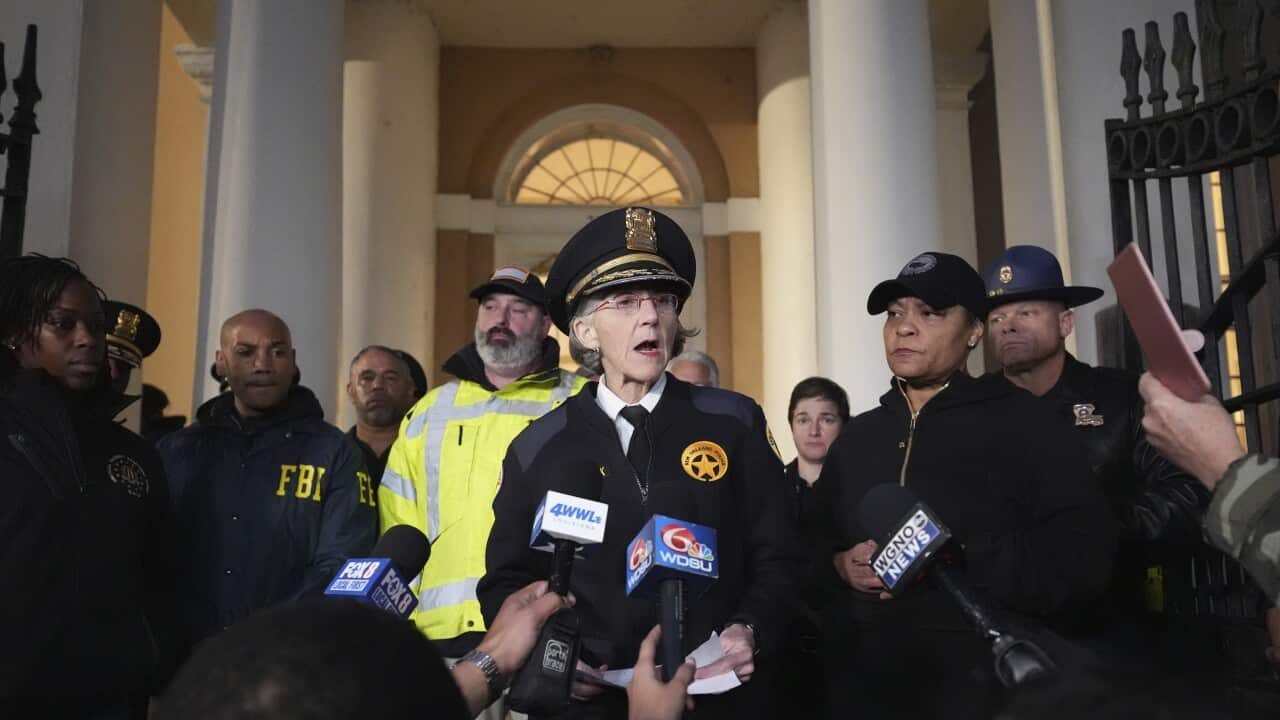English
For the fifth time in just eight years, mass coral bleaching is turning hundreds of sites across the Great Barrier Reef white.
Coral bleaching occurs when higher-than-average ocean temperatures cause coral to experience heat stress, causing them to expel the algae that provide much of their nutrients and colour.
The Great Barrier Reef Marine Park Authority says aerial surveys over two-thirds of the reef have confirmed widespread bleaching.
Dr Roger Beeden is the Chief Scientist at the Great Barrier Reef Marine Park Authority.
He says bleaching is not always fatal.
"It's important to remember that whilst corals that are bleached are clearly stressed, it doesn't always mean that there will be mortality. If conditions cool quickly enough, then even bleached corals can recover."
The marine authority, together with scientists from the Australian Institute of Marine Science, have completed aerial surveys of 300 reefs so far from Cape Melville, north of Cooktown, to just north of Bundaberg.
Scientists say the bleaching event follows a world-wide trend, driven by elevated sea surface temperatures caused by climate change.
Head of Oceans for the World Wide Fund for Nature ((WWF)) Richard Leck says the events leading to the bleaching started far earlier than Australia's summer.
"This is an event that's actually goes back to the European summer - we saw a massive coral bleaching in the Caribbean and the Florida reefs as well. So, it is hard to see how the Reef can cool down in this short window that it has in the next few weeks to avoid significant mortality, simply because the ocean is so hot currently."
Dr Beeden says the Reef has proven to be resilient in the past.
"It's also important to remember that the Great Barrier Reef has seen many periods of impacts and actually recovery. The most recent recovery following major events like coral bleaching and cyclones and crown of thorns starfish outbreaks underlying its inherent resilience, its ability to tolerate and recover from events."
Scientists are particularly concerned about southern parts of the reef, which have escaped previous bleaching events but are now recording their highest temperatures on record.
Richard Leck says it's unlikely the coral in the southern regions of the reef will be as resilient as others.
"That's a real concern for this event, is the heat seems to be focused very much in the south. It's probably the hottest that region of the Great Barrier Reef has ever been. And so those corals have very little ability to be able to withstand that heat. "
The Australian Marine Conservation Society says the recent event shows the government must be doing more to end fossil fuel projects.
Federal Minister for the Environment Tanya Plibersek says the government is working to protect the Reef.
"That's why we've legislated a pathway to net zero by 2050. It's why we're working hard to reduce carbon emissions in Australia do our part in the global effort to reduce carbon emissions, and also to make sure that we're transitioning Australia to more renewable energy to get to our target of 82% renewable energy by 2030. It's a tough time for the Reef at the moment, but we'll work together with governments around the world to make sure that we're protecting our reefs."
Reef campaigner and marine ecologist Dr Lissa Schindler shind-ler says the government's current target of a 43 per cent cut in carbon pollution by 2030 is consistent with a two-degree warming pathway.
She says this target would equate to the loss of 99 per cent of the world's coral reefs.
Queensland's Minister for Environment and the Great Barrier Reef, Leanne Linard, says a small temperature increase makes a big difference in the reef.
"It can be two degrees and while that doesn't sound significant, it is significant for our coral reefs. But we've also learned after these events that what we're doing as a government, a Queensland Government in conjunction with the Commonwealth Government, is about building the resilience of the Reef and we need to continue to focus on those activities so that when these events happen, our Reef does recover. "
Italian
Per la quinta volta in soli otto anni, lo sbiancamento di massa dei coralli sta facendo diventare bianche centinaia di zone della Grande Barriera Corallina.
Lo sbiancamento dei coralli si verifica quando le temperature oceaniche più alte della media causano ai coralli uno stress termico, inducendoli a espellere le alghe che forniscono gran parte dei loro nutrienti e del loro colore.
Secondo la Great Barrier Reef Marine Park Authority (l'Autorità del Parco Marino della Grande Barriera Corallina) i rilevamenti aerei effettuati su due terzi della barriera hanno confermato uno sbiancamento diffuso.
Il dottor Roger Beeden è lo scienziato capo della Great Barrier Reef Marine Park Authority.
Beeden sostiene che lo sbiancamento non è sempre fatale.
"It's important to remember that whilst corals that are bleached are clearly stressed, it doesn't always mean that there will be mortality. If conditions cool quickly enough, then even bleached corals can recover."
L'autorità marina, insieme agli scienziati dell'Australian Institute of Marine Science, ha completato i rilevamenti aerei di 300 barriere coralline da Cape Melville, a nord di Cooktown, fino a poco più a nord di Bundaberg.
Gli scienziati affermano che l'evento di sbiancamento segue una tendenza mondiale, guidata dalle elevate temperature della superficie del mare causate dal cambiamento climatico.
Il responsabile degli oceani per il World Wide Fund for Nature (WWF) Richard Leck afferma che gli eventi che hanno portato allo sbiancamento sono iniziati molto prima dell'estate australiana.
"This is an event that's actually goes back to the European summer - we saw a massive coral bleaching in the Caribbean and the Florida reefs as well. So, it is hard to see how the Reef can cool down in this short window that it has in the next few weeks to avoid significant mortality, simply because the ocean is so hot currently."
Secondo il dottor Beeden, la barriera corallina si è dimostrata resiliente nel passato.
"It's also important to remember that the Great Barrier Reef has seen many periods of impacts and actually recovery. The most recent recovery following major events like coral bleaching and cyclones and crown of thorns starfish outbreaks underlying its inherent resilience, its ability to tolerate and recover from events."
Gli scienziati sono particolarmente preoccupati per le zone meridionali della barriera, che sono sfuggite ai precedenti eventi di sbiancamento ma che ora registrano le temperature più alte mai registrate.
Secondo Richard Leck, è improbabile che i coralli delle regioni meridionali della barriera possano essere resilienti come gli altri.
"That's a real concern for this event, is the heat seems to be focused very much in the south. It's probably the hottest that region of the Great Barrier Reef has ever been. And so those corals have very little ability to be able to withstand that heat. "
L'Australian Marine Conservation Society afferma che il recente evento dimostra che il governo deve fare di più per porre fine ai progetti sui combustibili fossili.
La ministra federale dell'Ambiente Tanya Plibersek ha dichiarato che il governo sta lavorando per proteggere la barriera corallina.
"That's why we've legislated a pathway to net zero by 2050. It's why we're working hard to reduce carbon emissions in Australia do our part in the global effort to reduce carbon emissions, and also to make sure that we're transitioning Australia to more renewable energy to get to our target of 82% renewable energy by 2030. It's a tough time for the Reef at the moment, but we'll work together with governments around the world to make sure that we're protecting our reefs. "
Lissa Schindler, attivista per la barriera corallina ed ecologista marina, afferma che l'attuale obiettivo del governo di ridurre del 43% l'inquinamento da carbonio entro il 2030 è in linea con un percorso verso un riscaldamento di due gradi.
Secondo la dottoressa, questo obiettivo equivarrebbe alla perdita del 99% delle barriere coralline del mondo.
La Ministra dell'Ambiente e della Grande Barriera Corallina del Queensland, Leanne Linard, afferma che un piccolo aumento della temperatura fa una grande differenza per la barriera corallina.
"It can be two degrees and while that doesn't sound significant, it is significant for our coral reefs. But we've also learned after these events that what we're doing as a government, a Queensland Government in conjunction with the Commonwealth Government, is about building the resilience of the Reef and we need to continue to focus on those activities so that when these events happen, our Reef does recover. "




